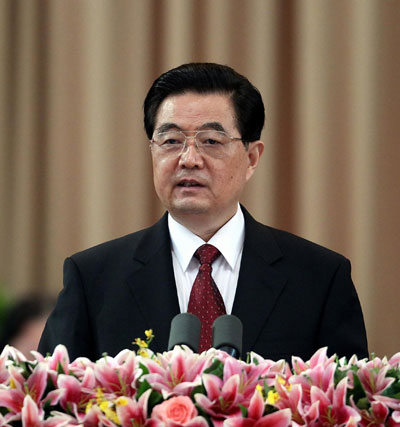 |
|
Chinese president Hu Jintao delivers a speech at the celebration ceremony to mark the 30th anniversary of the establishment of Shenzhen special economic zone September 6, 2010. [Photo/Xinhua] |
SHENZHEN - Shenzhen, a southern coastal city neighboring Hong Kong, marked its 30th anniversary as China's first economic reform zone Monday.
Chinese President Hu Jintao told a celebratory rally held in Shenzhen Monday morning the central government will always support the country's special economic zones (SEZ) embarking on "brave exploration" in their roles as "first movers."
|
||||
China's top legislature approved the establishment of the Shenzhen SEZ on August 26, 1980.
Hu, also general secretary of the Communist Party of China (CPC) Central Committee, said the Shenzhen SEZ has been the scene of miracles in industrialization, urbanization and modernization.
He said the SEZ has made important contributions to the country's reform and opening-up.
Once a small fishing village, the Shenzhen SEZ has evolved into a metropolis over the past three decades. It is home to the Shenzhen Stock Exchange as well as headquarters of many high-tech companies.
Looking back over its thirty years, the Shenzhen SEZ has taken the initiative with reforms and played an important role in the country's transformation from a highly centralized planned economy to a robust socialist market economy, he said.
The Shenzhen SEZ has continually maintained its development focus, persisted in opening up and served the country's overall development.
Under the principle of "one country, two systems," Shenzhen has played a role as bridge for the mainland to strengthen exchanges and cooperations with Hong Kong, Macao and Taiwan, for the nation's prosperity, stability and peaceful reunification, Hu said.
The achievements made by the Shenzhen SEZ has proved that the Party's basic theories, guidelines and experiences formed since the Third Plenary Session of the 11th CPC Central Committee in 1978 are "completely correct" and the decision made by the CPC Central Committee of establishing the special economic zones was "absolutely right," said Hu.
Only through the reform and opening-up could China, along with socialism and Marxism, develop. Socialism with Chinese characteristics is the only road to realize the revitalization of the Chinese nation, he added.
ACCELERATING TRANSFORMATION OF ECONOMIC GROWTH
Hu called on SEZs to become the spearheads in accelerating the transformation of economic growth model, which was a "significant, strategic task concerning the country's overall economic and social development."
A technological innovation system should be built to combine enterprises, market, production and research to enhance innovative capability of core technologies, so as to drive economic development with innovation, Hu said.
He called for accelerating the adjustment of the economic structure and boosting consumption, especially household consumption.
Efforts should be made to develop the advanced manufacturing industry and high-end service industry and seize the commanding position of emerging industries of strategic importance, he said.
The development of urban and rural areas should be well coordinated and the construction of the "new countryside" should be combined with urbanization, with cities playing a leading role, Hu said.
He also called for developing modern agriculture and increasing farmers' income, developing human resources, enhancing energy conservation and environmental protection, promoting low-carbon technologies and developing the green economy.
